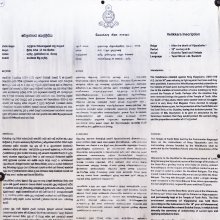Tulabhara, Tulābhāra, Tula-bhara: 5 definitions
Introduction:
Tulabhara means something in Hinduism, Sanskrit, the history of ancient India. If you want to know the exact meaning, history, etymology or English translation of this term then check out the descriptions on this page. Add your comment or reference to a book if you want to contribute to this summary article.
Images (photo gallery)
India history and geography
Source: Cologne Digital Sanskrit Dictionaries: Indian Epigraphical GlossaryTulā-bhāra.—(EI 4, 17, 26; SITI), name of a mahādāna; same as tulāpuruṣa; weighing a king or an exalted personage against gold or other precious metals and stones and distributing the same to temples, etc. Note: tulā-bhāra is defined in the “Indian epigraphical glossary” as it can be found on ancient inscriptions commonly written in Sanskrit, Prakrit or Dravidian languages.

The history of India traces the identification of countries, villages, towns and other regions of India, as well as mythology, zoology, royal dynasties, rulers, tribes, local festivities and traditions and regional languages. Ancient India enjoyed religious freedom and encourages the path of Dharma, a concept common to Buddhism, Hinduism, and Jainism.
Languages of India and abroad
Sanskrit dictionary
Source: DDSA: The practical Sanskrit-English dictionaryTulābhāra (तुलाभार).—gold, jewels or other valuable things equal to a man's weight (given to a Brāhmaṇa as a gift); cf. तुलादान (tulādāna).
Derivable forms: tulābhāraḥ (तुलाभारः).
Tulābhāra is a Sanskrit compound consisting of the terms tulā and bhāra (भार). See also (synonyms): tulāpuruṣa.
Source: Cologne Digital Sanskrit Dictionaries: Monier-Williams Sanskrit-English DictionaryTulābhāra (तुलाभार):—[=tulā-bhāra] [from tulā > tul] m. = -puruṣadāna, [Hemādri’s Caturvarga-cintāmaṇi i, 5, 619.]
[Sanskrit to German]
Sanskrit, also spelled संस्कृतम् (saṃskṛtam), is an ancient language of India commonly seen as the grandmother of the Indo-European language family (even English!). Closely allied with Prakrit and Pali, Sanskrit is more exhaustive in both grammar and terms and has the most extensive collection of literature in the world, greatly surpassing its sister-languages Greek and Latin.
Kannada-English dictionary
Source: Alar: Kannada-English corpusTulābhāra (ತುಲಾಭಾರ):—
1) [noun] gold, jewels or other valuables, grains or other articles as sugar, jaggery, etc. equal to a man’s weight (given as a gift).
2) [noun] a series of movement from back to forth (as a suspended object, pendulum, etc.).
Kannada is a Dravidian language (as opposed to the Indo-European language family) mainly spoken in the southwestern region of India.
See also (Relevant definitions)
Full-text: Tulapurusha.
Relevant text
Search found 11 books and stories containing Tulabhara, Tulābhāra, Tula-bhara, Tulā-bhāra; (plurals include: Tulabharas, Tulābhāras, bharas, bhāras). You can also click to the full overview containing English textual excerpts. Below are direct links for the most relevant articles:
The Linga Purana (by J. L. Shastri)
Chapter 30 - The mode of gifting the mountain of gingelly seeds < [Section 2 - Pūrvabhāga]
Sanskrit sources of Kerala history (by Suma Parappattoli)
18. Other Campus bearing on Kerala history < [Chapter 5 - Sanskrit Dramas and Campus bearing on Kerala History]
Appendix 1 - Sanskrit Works bearing on Kerala History
Other works dealing with the history and culture of Kerala < [Chapter 2 - Historical details from Mahatmyas and Prashastis]
Early Chola Temples (by S. R. Balasubrahmanyam)
Middle Chola Temples (by S. R. Balasubrahmanyam)
Temples In Tiruvalanjuli < [Chapter II - Temples of Rajaraja I’s Time]
Appendix on Tiruvalangadu Copper Plates < [Chapter I - Rajaraja I (a.d. 985 to 1014)]
Later Chola Temples (by S. R. Balasubrahmanyam)
Temples in Kanchipuram (Vishnu Kanchi) < [Chapter II - Temples of Kulottunga I’s Time]
Pallava period (Social and Cultural History) (by S. Krishnamurthy)
The priestly class < [Chapter 3 - Socio-Religious Life]
Status of Women < [Chapter 3 - Socio-Religious Life]
The Later or the Imperial Pallavas < [Chapter 1 - Introduction]
